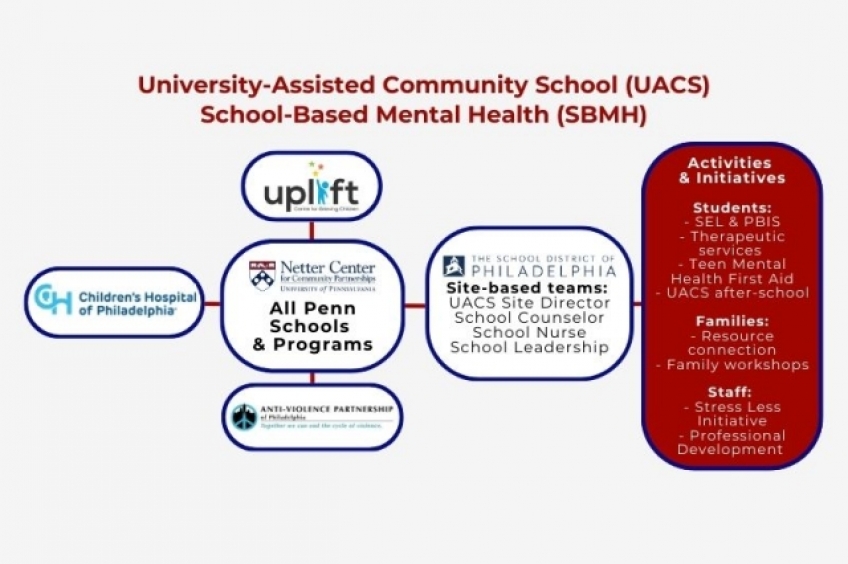UACS School-Based Mental Health
OVERVIEW
In January 2021, the Netter Center began its collaboration with the Children’s Hospital of Philadelphia’s Healthier Together initiative (CHOP HT) to develop and implement University-Assisted Community School (UACS) school-based mental health (SBMH) partnerships. The activities coordinated through this collaboration aim to support UACS students, families, caregivers, and staff. CHOP HT has catalyzed additional SBMH partnerships and programs, contributing to the implementation of a more comprehensive multi-tiered system of supports (MTSS) that is democratically and collaboratively implemented with school and community partners.
UACS SBMH’s overarching goal is to develop place-based partnerships that implement comprehensive approaches to social, emotional and mental wellness through UACS. To achieve this, the program activities outlined below aim to (1) cultivate the development of social and emotional skills among UACS K-12 students, (2) promote learning environments that are nurturing, inclusive and safe for youth (3) develop democratic, participatory partnerships engaging across all UACS partners (e.g. students, families, teachers, school leaders, and partner organizations), and (4) assess the cumulative impact of UACS SBMH supports and services on individual participants, the UACS school communities, and the partners (e.g., Netter UACS, CHOP HT, partners who help implement the program).
Netter also aims to engage Penn students and trainees in UACS SBMH, which has two impacts. First, it provides sustainable human capital and addresses long-standing shortages in K-12 student support services in schools by providing more individualized support for school students and families, helping coordinate activities and communicate with partners. Second, it helps improve the education of the University students, not only providing valuable training opportunities but also promoting these students’ consideration of these employment opportunities.
MAJOR PARTNERSHIPS & ACTIVITIES
Anti-Violence Partnership of Philadelphia (AVP)
- The Netter Center partners with AVP to implement its Youth Violence Outreach Initiative (YVO) in UACS. YVO provides services with a focus on breaking the cycle of violence and trauma in our community. YVO partners with Philadelphia schools to identify young people who have experienced violence-related trauma. AVP therapists and counselors provide a variety of trauma-informed services including individual clinical therapy, psycho-educational groups, and mentoring. This initiative promotes social justice by reducing the stigma around trauma and by providing supportive services that build resiliency and hope for youth in our community who have been impacted by violence.
CHOP Department of Adolescent Psychiatry and Behavioral Sciences
- The Netter Center partners with CHOP DCAPBS to collaboratively design and develop effective SBMH models for Philadelphia schools. Cognitive Behavioral Intervention for Trauma in Schools (CBITS) is an evidence-based group intervention aimed at relieving symptoms of posttraumatic stress disorder, depression and general anxiety among children exposed to multiple forms of trauma.
Mental Health First Aid – National Council for Mental Wellbeing
- Mental Health First Aid (MHFA) is an evidence-based, early-intervention course that teaches participants about mental health and substance use challenges. It was developed by the National Council for Mental Wellbeing. The Netter Center has two certified MHFA instructors on staff.
- Youth MHFA is designed to teach parents, family members, caregivers, teachers, school staff, peers, neighbors, health and human services workers, and other caring citizens how to help an adolescent (age 12-18) who is experiencing a mental health or addictions challenge or is in crisis. Youth MHFA is primarily designed for adults who regularly interact with young people.
- Teen MHFA is an extension of the MHFA program that prepares young people to provide support for their peers as well as better cope with mental health challenges themselves. Teen MHFA is designed for high school aged youth.
The Stress Less Initiative (SLI)
- SLI is a curriculum offered to UACS teacher-partners and staff that focuses on building personal & team resilience and prevention of secondary traumatic stress (STS). The program consists of a 12-session group model that includes psycho-education, screening, and assessment for STS, learning and reflection activities targeted to increase protective factors (while reducing risk factors), processing of work challenges and rewards, and coping skills to build resilience. SLI was developed and is supported by the CHOP Center for Violence Prevention.
Uplift Center for Grieving Children (Uplift)
- In partnership with Netter Center staff, school counselors, and Penn student interns, clinicians from Uplift offer 6-week peer support groups for grief and loss at UACS.
University-Assisted Community Schools (UACS) Social-emotional Learning (SEL)
- Academic year (after-school)
- SEL coaches hired by the Netter Center co-facilitate evidence-based SEL curriculum in after school spaces with Penn student support. This includes yoga and mindfulness, conflict resolution, peer mediation, and de-escalation among other related activities and skill-building.
- Calm Space is an SEL program hosted at one of our UACS high schools. It was co-designed and developed by high school students and aims to provide a safe environment for students to reflect, relieve stress, and build relationships after school, focusing on building skills like self-awareness, self-management, responsible decision-making, social awareness, and relationship building, with both social and quiet areas.
- SEL coaches hired by the Netter Center co-facilitate evidence-based SEL curriculum in after school spaces with Penn student support. This includes yoga and mindfulness, conflict resolution, peer mediation, and de-escalation among other related activities and skill-building.
- Summer (summer camp)
- SEL coaches and SEL associates hired by the Netter Center work collaboratively with site leaders to support the mental and behavioral health of each K-8 summer camp. SEL coaches often include school-year counselors, climate team members or other mental health professionals and SEL associates are Penn student interns from related Penn programs such as counseling, social work, or public health. Together, coaches and associates create a UACS Summer Wellness Team. Similar to the after-school program support outlined above, these teams facilitate evidence-based SEL curriculum, coordinate related partnership activities, and support conflict resolution, peer mediation, and de-escalation as needed.

